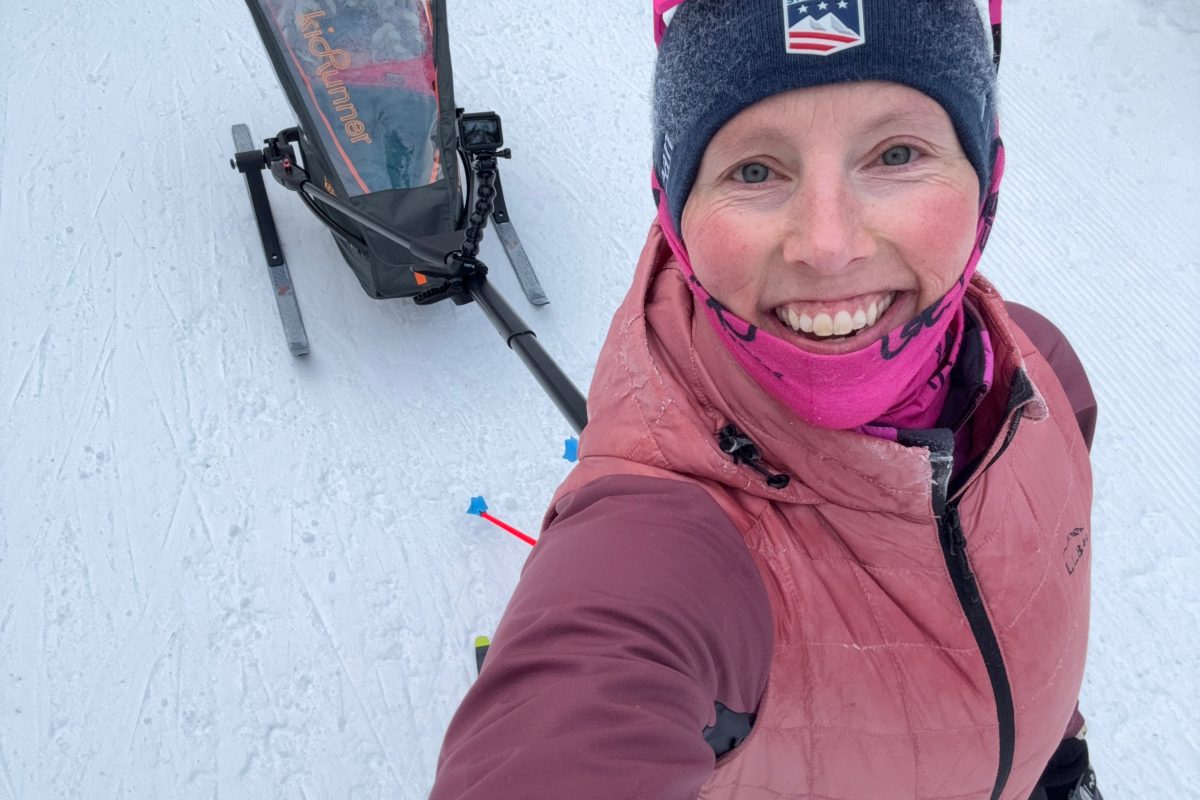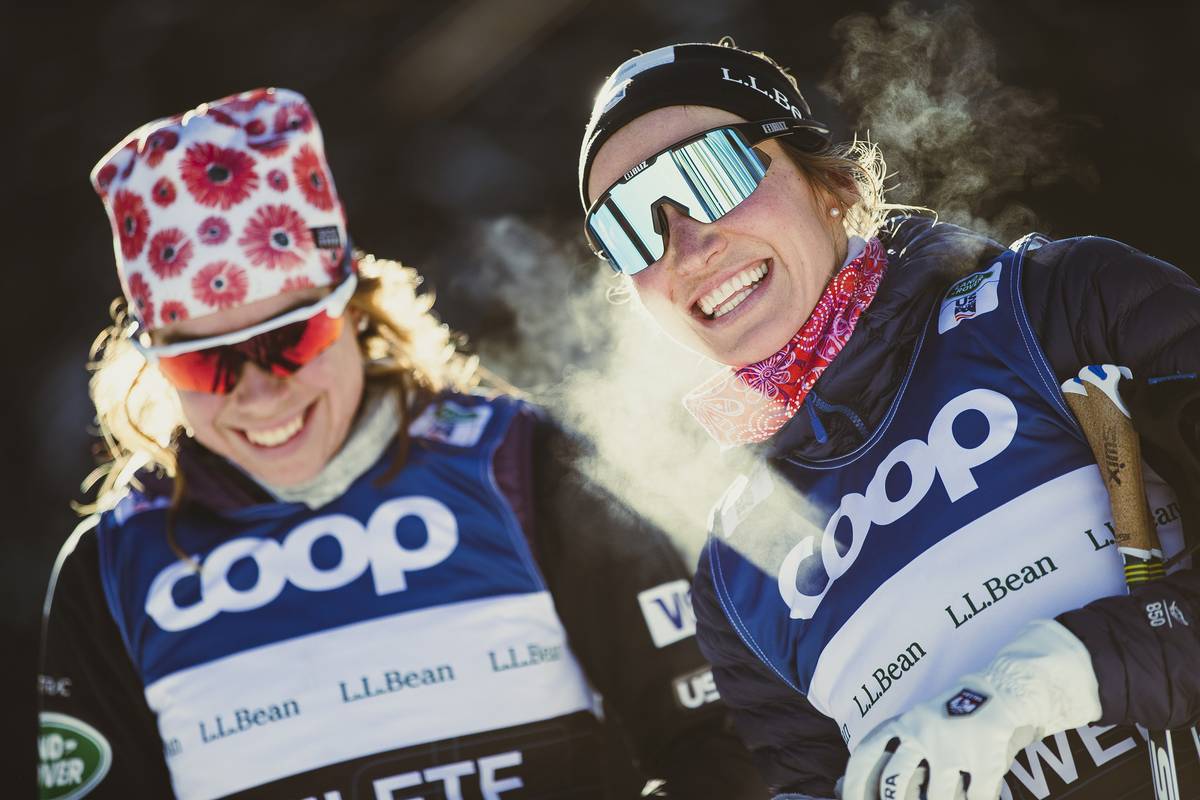
By the time you read this story, Vermont’s Sophie Caldwell Hamilton will have turned a fresh thirty-one. Her birthday is today, Monday, March 22. Although Caldwell Hamilton began representing the U.S. Ski Team on the World Cup in Québec City in 2012, she is profoundly Green Mountain State. Raised in Peru, Vermont near where she later attended the Stratton Mountain School, we’re pretty certain that, in a metaphorical sense, she bleeds maple syrup. As much as she has been the object of our European cross-country ski racing coverage for nearly a decade, she is a Vermonter. She graduated from New Hampshire’s Dartmouth College, we’ll let that slide, but it’s only a sprint finish few hundred meters across the Connecticut River from Vermont. Post-college, she trained with the SMS Elite team with the likes of Jessie Diggins, and husband Simi Hamilton.
As we begin this close-out piece regarding Caldwell Hamilton’s retirement, which she announced March 11th as she was quarantined in Engadin, Switzerland, we’ll begin with the race stats. According to the modern FIS database, Caldwell Hamilton is one of five U.S. women to have won a World Cup race. Alison Kiesel (formerly Owen-Spencer) won the inaugural women’s World Cup event in December 1978 at Mount Telemark in Wisconsin. Kikkan Randall broke her ground by initially winning in 2007. Caldwell Hamilton first won in 2016, to be followed by Diggins that same year. Rosie Brennan posted her first World Cup victory this season. That, when considering the women’s team has headlined the U.S.’s cross-country media coverage for a decade, is rarefied ground.
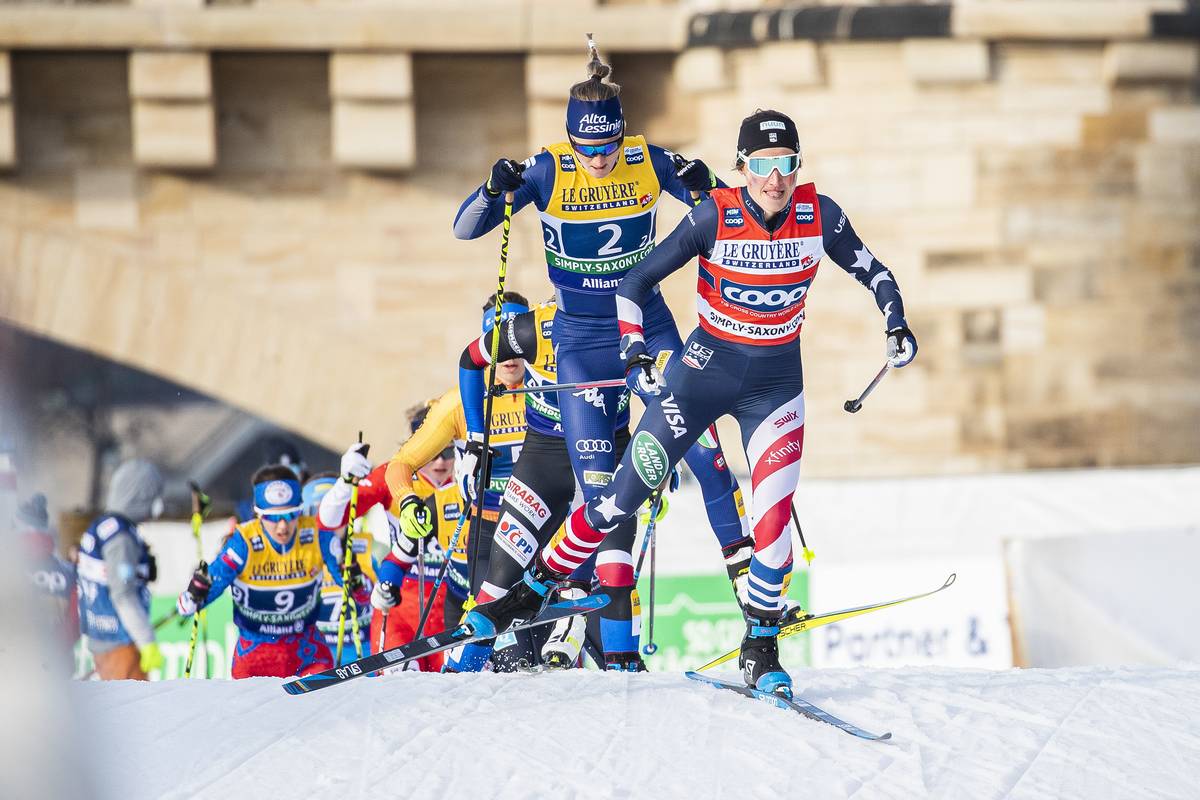
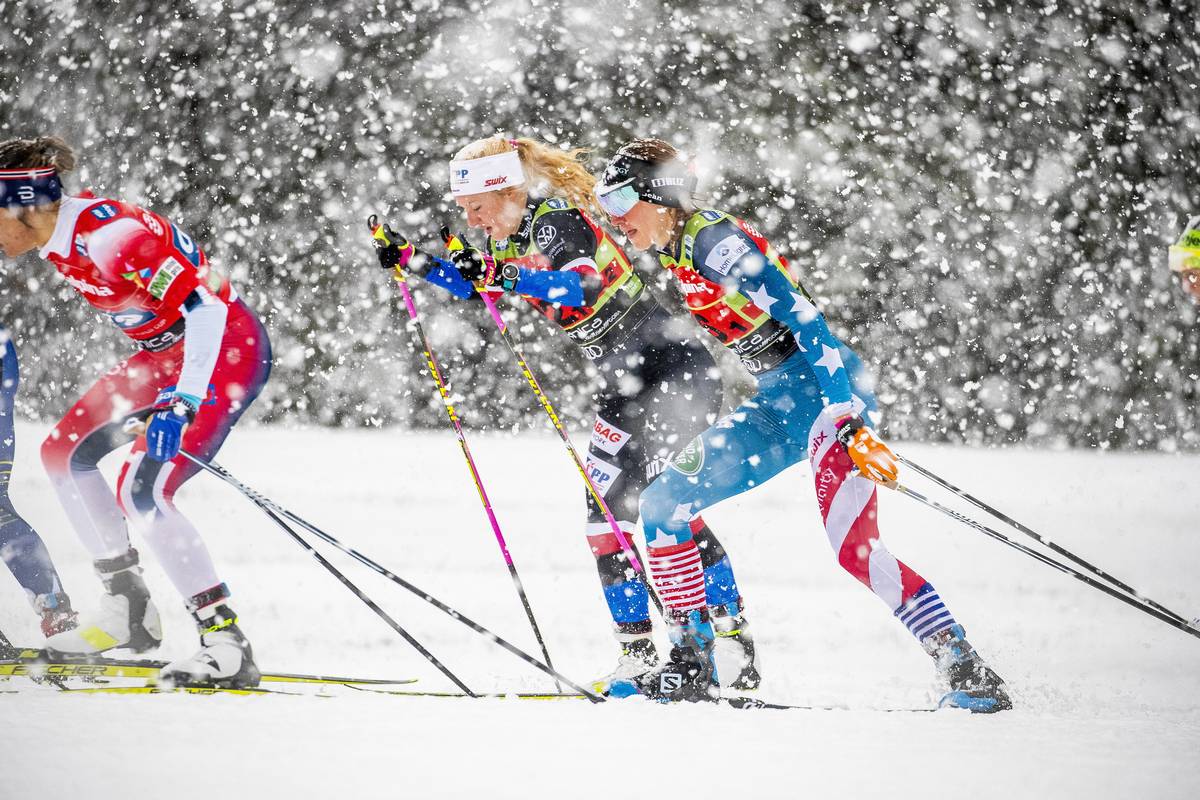
Caldwell Hamilton won two World Cup sprints, one in Davos the other in Oberstdorf. Over her World Cup career, during which she was a feared sprinter, she advanced to 16 sprint finals for four fourth places, and 10 podiums. She notched five second-place finishes, three third-place finishes, and the two aforementioned wins.
At the 2014 Olympics she placed sixth in the skate sprint, and eighth in the 2018 Olympic classic sprint. Her top result at the World Championships was sixth place in the 2017 Lahti, Finland skate sprint.
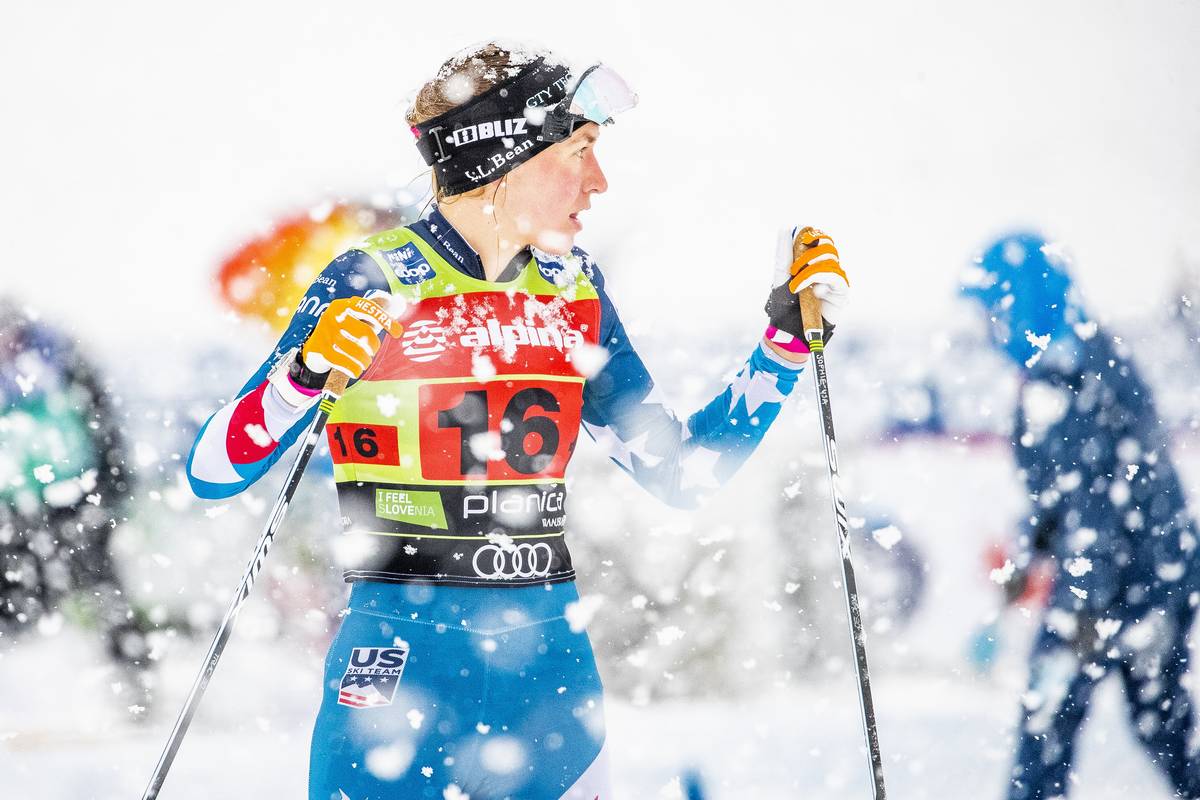
From a consistency standpoint, Caldwell Hamilton shined. In 2014 she was ranked eighth overall in the sprint standings. That was followed by a 20th, seventh, eleventh, third, fourth, sixth, and tenth this season considering her career World Cup sprint rankings.
Compartmentalizing her as a sprinter isn’t totally accurate either. This is the World Cup after all. She ranked in the top-30 in the distance standings five times. In 2018 when she was third overall in the sprint cup, she was 19th in distance.
She was also part of a 2016 second place 4 x 5-kilometer relay team with Sadie Maubet Bjornsen, Liz Stephen, and Diggins. That result was repeated with a Caldwell Hamilton, Maubet Bjornsen, Brennan, and Diggins quartet in 2019. Caldwell Hamilton placed third twice in the team sprint, both times paired with Ida Sargent, in 2017, and 2018, respectively.
Her technique, wholly refined, was smooth, the angles perfect, and at times, crushingly powerful. She raced sprints with smarts, knowing her capacity was not her ace card. But damn, could she toe at the line. A mix of old-school Nuryev in its grace and the “pow” of Ali.
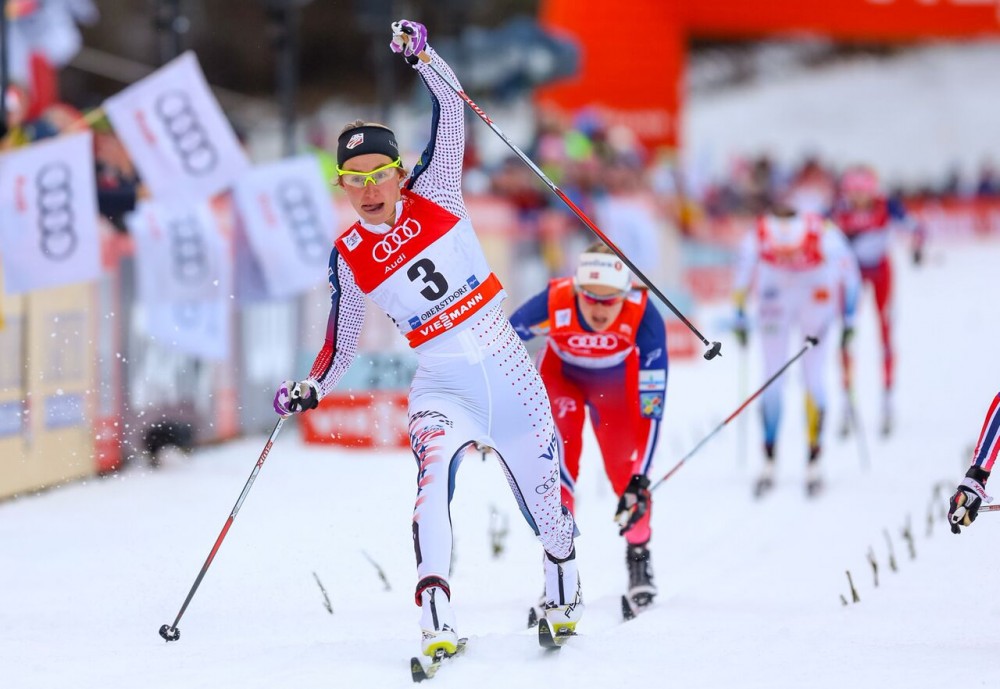
We’ve condensed Caldwell Hamilton’s results for roughly 400 words. A much smaller part of this written whole. That is, perhaps, on-point. Although historic in the annals of American cross-country skiing, Caldwell Hamilton’s human qualities, foremost among them, empathy and compassion, may, be her lasting legacy. As much as physical exertion can reveal the core of a person, Caldwell Hamilton’s energy exuded while skiing was revealing. “Serene,” was a word writer Bill McKibben used on several occasions on our podcast recently to describe Caldwell Hamilton as she sped past either in a local Vermont race or the World Cup.
Her coach at Dartmouth, Cami Thompson Graves, added that Caldwell Hamilton led by example and has inspired. “Sophie has always been a pro when it comes to racing, when she puts on the bib, she knows how to race hard, although she is one of the most graceful skiers I have ever seen so she makes it look easy! I am so glad that she decided to make skiing her career for a while,” wrote Thompson Graves. “How cool is it to see that friendly, young woman who grew up racing in Vermont and New England, who trained locally and helped out at numerous camps in the off season go out there and fiercely compete for World Cup medals. I know she has inspired many, many young women to follow in her footsteps.”
***
I’m going to take a moment to allow longtime U.S. Ski Team and personal coach to Caldwell Hamilton, Matt Whitcomb, fill in some gaps for us with this Q & A:
FasterSkier: Nugget of wisdom that you have learned and now apply in coaching/life from Caldwell Hamilton?
Matt Whitcomb: Just because someone says they are okay, and seems like they are okay, doesn’t mean they are okay. Ask again, later.
FS: Most difficult aspect about Caldwell Hamilton in terms of priming her for peak racing, and how did you navigate that issue?
MW: This year notwithstanding for Sophie, she’s been easy to peak for championships. The main difficulty with her is maintaining muscle mass when we can’t find good gyms. She needs two good strength workouts per week or she will lack adequate power. Fortunately, she also puts on muscle mass responsively.
FS: Easiest part of coaching Sophie?
MW: For me, the most important skill a coach can have is the ability to connect with others. Simi and Sophie are great friends, so that connection—that two-way flow of concern—makes coaching them easy. A hard part of coaching is not knowing the unspoken stresses of an athlete. This stuff needs to be tackled first before any training can take.
FS: Non-competition personality trait that made the “team” more of a team?
MW: Sophie makes everyone a better person. Who is the best human I know? I’m not being dramatic; it’s Sophie Caldwell.
FS: Sophie describes her side of the room as a hurricane. How might this trait manifest as an xc skier?
MW: The one whose clothes singe on the lamps, and carpet the floors, and whose passport gets lost in the couch cushions, and who might race a semi-final at World Championships on Jessie Diggins’ poles even though they are five centimeters shorter, and who… okay I’ll stop… well, she just needs to be fit and happy on race day. She’s better at adapting in the moment.
FS: Proudest moment as Sophie’s coach?
MW: I don’t hang my hat on results, so nothing really jumps out there. That they raced into their 30’s is my proudest accomplishment for them. Many good athletes in the U.S. quit in their early 20’s before they had a chance to bloom. I’m also feeling proud of the way they handled their quarantine during their intended last World Cup races, which should’ve been a week-long celebration of their ski careers. (As I write, they successfully boarded and are on a plane home.)
FS: I know Sophie and Simi, who is also retiring, consider you a close friend. How did you balance that when coaching her? How did that enrich the experience?
MW: I don’t subscribe to the you-can’t-be-friends-with-athletes rule when it’s adults coaching adults, but that only works if you can maintain your ability to get tough from time-to-time. We’ve been through some hard personal times together, and it hasn’t always been just me supporting them. I ski coach because I like to ski, and because I like to connect with people. Sophie and Simi are two of the people I credit for me still loving my job after so many years.
FS: Sophie’s lasting legacy when it comes to team culture?
MW: For Sophie, everyone—except those who lack empathy—are good enough for her. It doesn’t matter who you are; Sophie Caldwell will ski with you, or sit with you at lunch. She will not judge you, and her departure will expose us. We’ll need that role filled in, and I have a couple of safe guesses on who it will be.
***
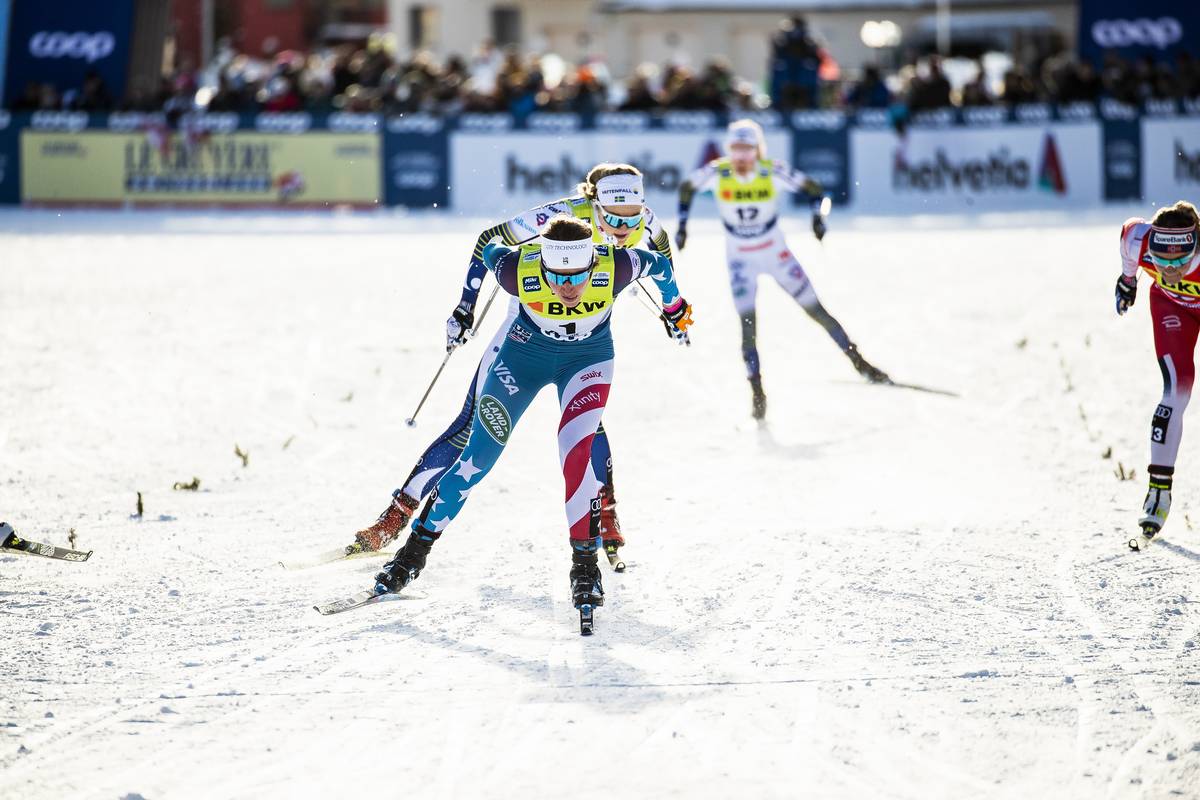
Devon Kershaw, a former Canadian skier who knows Caldwell Hamilton from the World Cup, commented in a recent podcast that Caldwell Hamilton had a rare type of leadership skill set. “The leadership qualities of Sophie that might not shine through to those who are not so close to the project, she has this quiet confidence that I have not seen by many athletes in my career,” said Kershaw. “Not only that, she is incredibly kind, she is incredibly caring, she doesn’t take up a lot of space, which you might think, ‘Is that good or is that not good?’ But when you think about it, you are traveling the world for months on end, having someone so kind, so caring, who doesn’t take a lot of real estate, but when she talks, when she says something, everyone listens.”
There is also the real person, non-ski racer side to Caldwell Hamilton. A little FasterSkier mining reveals these nuggets from Caldwell Hamilton: “I was bald until I was 2!”; “I grew up with two Dalmatians named Daisy and Douglas. They were around my age, so I thought I was a dog for the first couple of years of my life.”

First on skis at 10 months old, her confidence on dicey downhills and hunting podiums is masked by an endearing self-effacing quality. “I was probably the last person who woke up this morning and thought this would happen,” Caldwell Hamilton told FIS in a post-race interview after her first World Cup win in 2016. “I’m thrilled.”
Thrills, by definition, are fleeting. We’ll explore more about that with Caldwell Hamilton in the interview that follows. We conducted this lightly edited interview with Caldwell Hamilton last week as she was concluding her mandatory 10-day quarantine in Switzerland after testing positive for Covid-19 one day, and negative the next. Either way, the Swiss keep it tight. Despite several negative tests and no symptoms, Caldwell Hamilton missed the final weekend of World Cup racing. She has subsequently returned to Vermont.
***
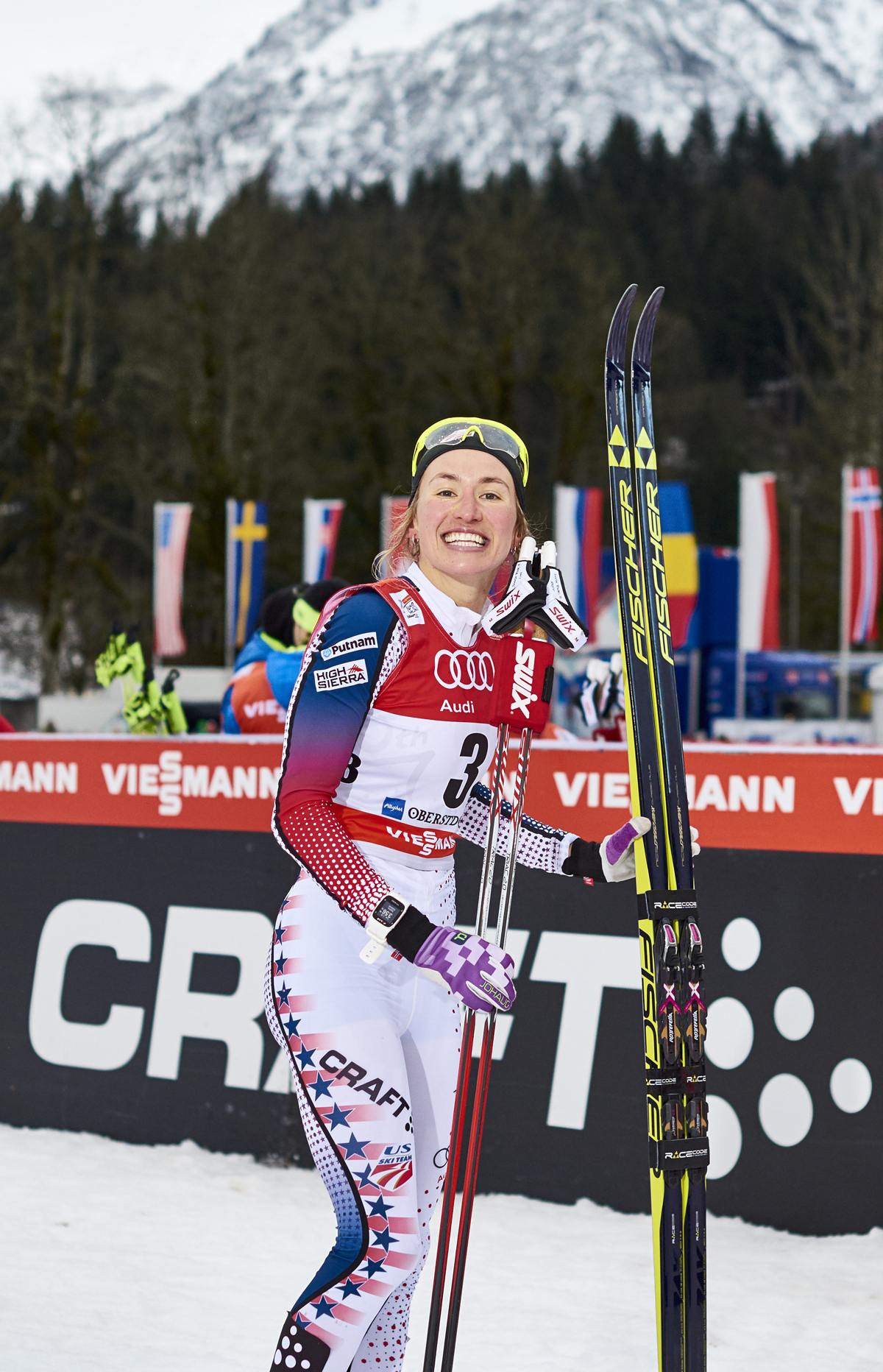
FasterSkier: You’ve been high in the sprint standings throughout your career. You were someone fighting for top-fives and podiums. Holistically, how would you categorize yourself as a sprinter?
Sophie Caldwell Hamilton: I guess the consistency of the sprint standings does kind of go hand in hand with how I like to approach each season. I wanted to have that consistency of being confident that I could make the finals on any given sprint day just helped. Rather than focusing on a podium at a specific race, or win a medal here, I think for me, it was if I can get in a groove of consistently making the final, I know I’d have the confidence to get some podiums. For me, that was kind of a nice way to approach the season, and I think I felt like I was in a good place and confident when I could have that consistency — which I maybe did not have so much of this year. But I think results build on each other out of that consistency.
I’ve known for a long time that I don’t have the biggest capacity. For me, I think when I approach sprints, I always tried to see myself as technically and tactically one of the best sprinters in the world because I knew I didn’t have the biggest motor. So my style is never to go out and lead from the beginning. I always try to be the smartest racer I could and that was something I was proud of. I think it’s important for younger skiers coming up to know that just because they don’t have the biggest engine or the most hours trained, you can find other ways that you can be the best.
FasterSkier: You can see it in some at an early age, a real deep instinct to “win,” I mean some call it the “killer instinct”. You know, win, win, win and that is all that matters. You’re obviously competitive – you are a professional ski racer. But, can you describe your competitive drive? When I speak to you and watch you, what I do not see manifesting are any of the negative attributes we might associate with being a competitive person.
SCH: That’s a topic that I’ve spent a lot of time thinking about especially later in my career. Sometimes I do wonder if I’m competitive enough to be doing this. I think you do have to have some sort of base level of competitiveness to pursue professional sport, or maybe even sport in general. But, I think as I’ve gotten older, it’s been harder and harder for me to find that competitive drive. I don’t think you have to be the most competitive person in the world to be successful. That said, it can be hard sometimes because I think especially as I’ve gotten older, I’ve watched some of these young girls coming out, not necessarily Americans, but, you know, the Swedish girls maybe for example. They want more than anything to win. And that’s hard to compete with. I think mentally that’s been a little tough for me because I’m kinda like, well, that’s certainly not how I feel now, and I don’t know if I was ever like that, even when I was 20 years old.
I guess my level of competitiveness has definitely been something that I’ve put a lot of thought into. I don’t think it’s necessary, but sometimes it can be hard to compete with. Again, just as an example on the Swedish team, it’s like my gosh, that level of competition just to get a sprint start is incredible.

FasterSkier: How has your perception of the World Cup evolved?
SCH: Well, you know, I think the level of competition is always rising, which is really cool. It’s crazy to watch how the sport is changing. I obviously have done sprints, but I think if you go back and you watch a sprint from 2012 or 2014, you have someone like Kikkan who’s just absolutely dominating. She is so much stronger and so much better than anyone else in the sprint.
It seems like now, you don’t see so much of that. I know Klæbo can show up on the men’s side. And Linn Svahn can be dominant, but it’s not like people go out and they drop the field in the first 20 seconds. I think everyone’s level has risen so much. Everyone is fit. Everyone is strong. So you have to ski to the finish and be strong and ski the smartest. So I think that’s a pretty cool thing to see, just to watch the level rise. Of course, since I’ve been doing it non-stop for the last eight years, I don’t really notice that until I go back and I watch a race from a long time ago or think about what sprints used to be like for me when I first got it on the World Cup.
FasterSkier: You’re choosing to step away before an Olympics. You’ve been to several Olympics, and I understand it’s not like you need that feather in your cap to validate who you are. But you’re stepping away, you know with say 11 months to go before the Olympics. Was that planned all along, or just sort of organic and you simply don’t have the energy to deal with the uptick in demands during an Olympic year?
SCH: I mean we never knew this was going to be the year we retired. I think for a while we took it a year at a time. But, yeah, I think a lot of people have been surprised that we’re retiring right before the Olympics. I guess the way I see it is that I’ve been before and so I don’t feel like I need to go to the Olympics just to go to the Olympics. And, if I went to the Olympics, I would want to be in a place where I could be competitive and ski at my best. I think I’m at the point where I’m too mentally tired to put in the work for another year. I would rather see someone who has never been, like one of the young girls, to be able to go and have that experience that I had at my first Olympics rather than go to my third Olympics just to have gone to my third Olympics.
The Olympics are an incredible experience. My first Olympics in Sochi will always be one of my favorite experiences. You know, as far as competition goes, World Cups aren’t any less competitive, or they’re more competitive. So, yeah, I feel like the weight of the Olympics isn’t as big for me anymore, especially if I feel like I’m not in a place where I can prepare myself to be performing at that level.
I think for every person, no matter what they do, there’s always an evolution as you age. You’re aware of what’s happening around you and you simply age out of things, and sports is an obvious one because it favors the young.
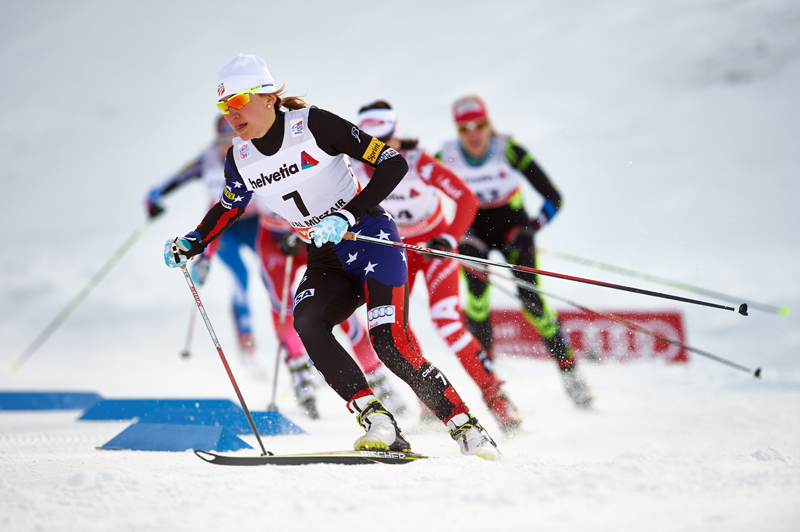
FasterSkier: For you, on a high power women’s team, what has it been like for you in terms of being part of the core, the center, and slowly moving to the side as other women have stepped up?
SCH: This might have to do with that question. Part of the reason we also want to be done now is I think we want to stop while we still love the sport and finding some success, because I think it always feels good, rather than the sport become stale or having everyone else be like, ‘Oh, they’re still skiing’.
But, yeah, back to the other question. It’s been interesting because when I first came on to the World Cup, at 22 or 23 years old, everything was new and exciting. You don’t have any expectations and in a way that’s really nice to not put any pressure on yourself or have any expectations. You can just enjoy it and screw up every once in a while. But learning from your mistakes, I think, in a way, becomes harder and harder the more results you get because your expectations grow.
That said, it’s been really cool watching those young girls come up. I forget sometimes how much younger they are, eight years younger or something, which is about the time when I was coming on the World Cup and I feel like they’ve already accomplished so much compared to what I had at that age.
Sometimes I find myself wanting to guide them and give them advice, and I think I have and it’s been helpful. But they also have to figure it out on their own as we did. And like I said before, I was young with expectations and having some good results at that age but I was also screwing up and doing some things that didn’t work early.
I was having a conversation with Julia [Kern] the other day just about the inconsistency at that young age. I remember my first few years on the World Cup, I felt like I had a good year then an off-year. I remember thinking like, ‘Oh my god, I think it’s just how it’s gonna go it’s gonna be up and down and up and down.’
I figured it out. That’s what you’re doing when you’re young, you’re trying things and sometimes it works and sometimes it doesn’t. And when it doesn’t you change something for the next year and after a few years of doing that, I think you kind of figure out what works for you. But so many of those girls are still at the age where they haven’t figured it out, which I think is really cool, and they probably will have some inconsistency in their careers early on. But they’ll get to a point where they’ll figure it out. When you look at my training or Jesse’s training, it is not rocket science. I figured out what worked for me and I changed it a tiny bit each year, but I’m not going to go try something crazy different at this point because I’ve found a pretty good routine.
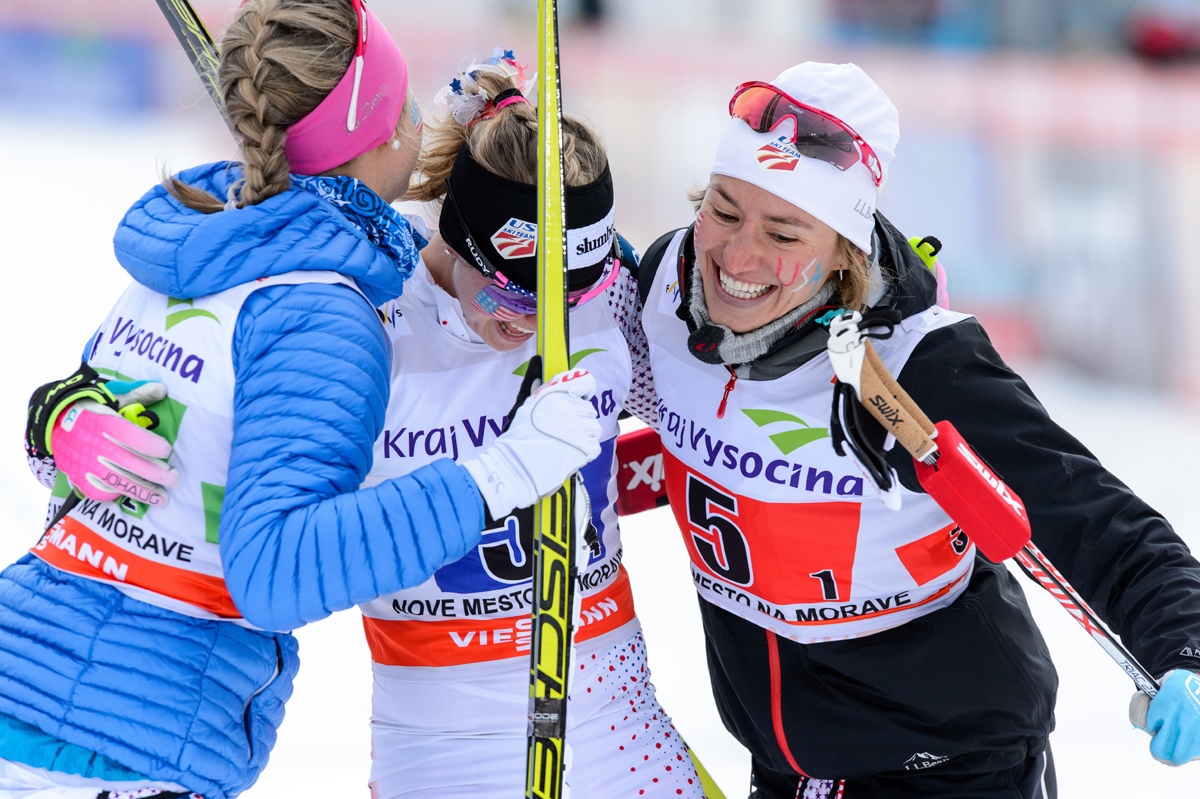
FasterSkier: The softball retirement question. What are you most proud of?
SCH: I mean I guess I touched on this a little bit before, but I think I’m proud of my consistency as one of the top sprinters, and just showing that there are different ways to be successful. Sometimes people think a specific win is what you should be most proud of. Or that you go out there and put your head down and work harder than everyone else. But I think I found a different way to do it. And like I said, relying on technique and tactics and being a smart skier is something I’m proud of.
FasterSkier: What are you most proud of when it comes to your legacy on a positive team culture?
SCH: Well it’s interesting. I have had this conversation about the importance of safe spaces or feeling like you’re in a safe space and not judged when you’re on the road for a whole season. I think it’s really important to have one or two people that make you feel that way. Maybe it’s you who is the safe person or you provide a safe space. I think, for me, it’s always been very fulfilling and been a goal of mine to be that for other people, and I think, in general, I’ve been able to do that — particularly with the younger girls, I hope.
I’m not someone who is very loud or says much at team meetings or in public. I hate public speaking. But I do love connecting with people one on one. So yeah, the relationships, the connections I’ve been able to make and the relationships that I’ve had that are more in a one-on-one setting. I feel I have been very valuable and meaningful and I hope that I’ve been able to be kind of a safe person for people.
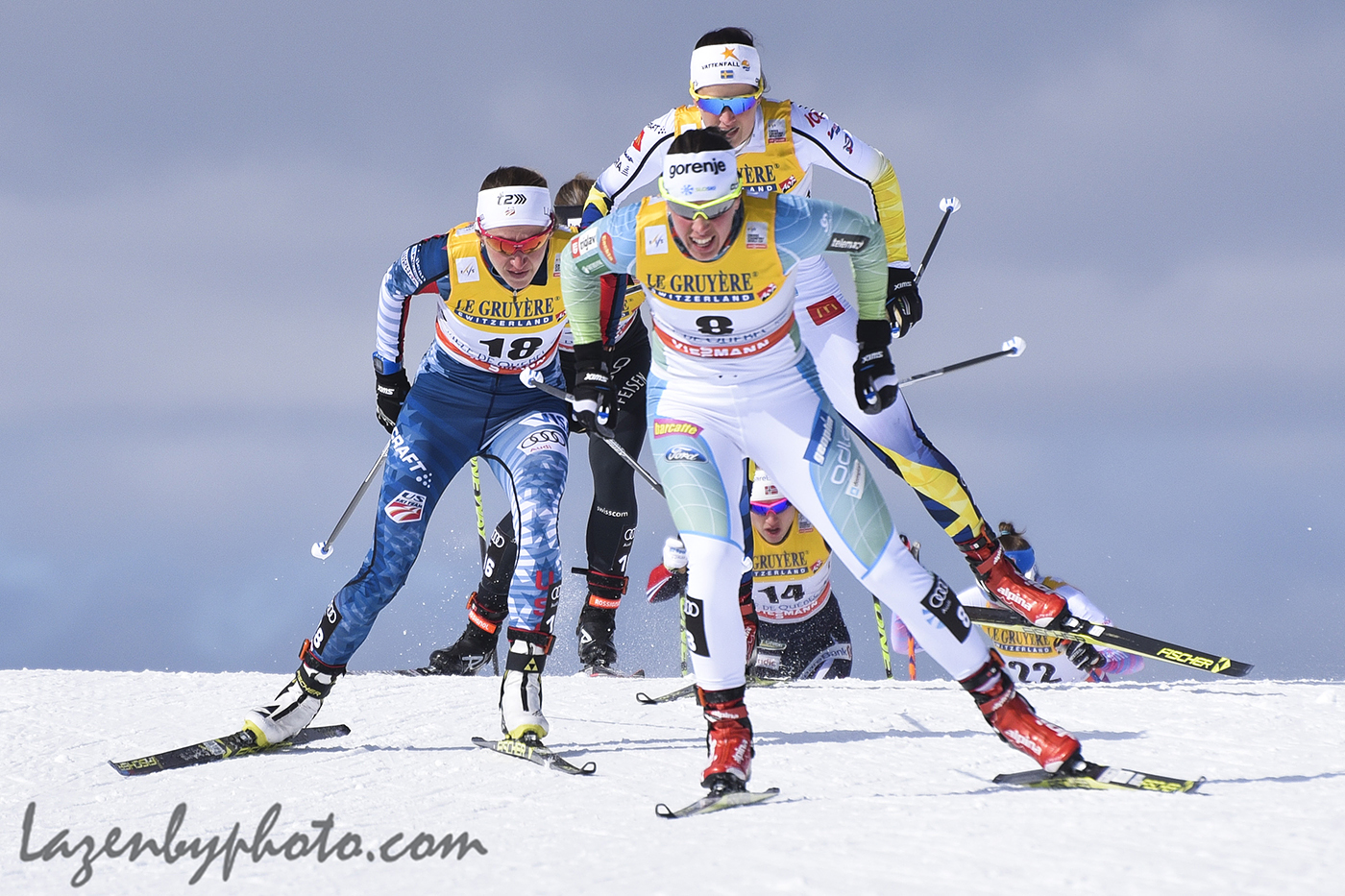
FasterSkier: How do you frame this sport, as you begin thinking about having a family of your own, when you think about competition and when you think about it as just a way to engage with nature? Those are two very different experiences. And I mean let’s face it, you have had a competitive experience that very few people can relate to.
SCH: We hope that we can start a family someday and I think that’s something we’re both looking forward to at some point. Navigating that relationship with sports, with our kids, will be interesting because I think, I mean I’ve probably said this before to you, but I think for me, the reason that I ski raced for as long as I did was that my parents were very good about how they exposed me to the sport without putting much pressure on me to be a ski racer.
I think the greatest thing about sports when you’re young is that it can be this social thing you do with your friends. And I think it’s so important to try a bunch of different sports. I definitely plan on introducing my kids to cross-country skiing but I hope they’ll try a bunch of different things whether they pursue cross-country skiing or not. That’s totally up to them. But, I do plan to introduce them to it at a young age and hopefully, it’s something that their friends do too and they can enjoy it that way and then decide where they want to take it. But I’m sure it’s easy to say, I’m not going to put any pressure on them now and maybe as a parent, or when you become a parent, it becomes more difficult. But I think my parents did a very good job. So I would plan to model it off whatever they did, and hopefully, my dad can give me some advice on that.
FasterSkier: I know you lost your mom not so long ago and I know you were close. I also know you’re not a very public person. But I’m curious how that experience may have informed you about keeping things in perspective when it comes to sport?
SCH: I’ve always tried to look at skiing as just one part of the bigger picture. Skiing has never been my life, it’s something I do in my life. I’ve always tried to be a real person before I’ve been a skier. And I think when my mom got sick and when I lost her, that definitely put it all into perspective even more. It was a no-brainer to fly home that winter and to spend the next year at home with her. There’s nothing I would change about those last ten months I had with her from when she was diagnosed to when she passed away.
It was interesting because she passed away not this last fall, but the November before. And so, I went on the World Cup about a week after she passed away and I didn’t know what it was going to be like. In hindsight, I think I was probably a little numb all that winter. I had my fair share of sad moments and Simi was usually the only one to see.
But in general, I was a pretty happy person. I remember looking back and realizing I didn’t cry about a single result that year — not that I was a huge results-crier before. But sometimes you get a disappointing result and you’re tired and your emotions take over and you shed a tear. But I think that whole experience just put it into perspective for me. You’re allowed to care about skiing for sure, I hope people care about it. But in the grand scheme of things, it’s just a ski race and there are so many more important things in life.
I was still able to have a really great season that year, and my preparation going into that season was absolutely not ideal and it was a huge emotional roller coaster. But, I spent her last year doing exactly what I wanted to do and what I needed to do. In that sense, I think I was and am in a place where I have no regrets even though it was, obviously, a very sad time.
For me, it highlighted the importance of relationships, even more. And so, yeah, you know I’ve had, I have a very strong support system between my Simi and my family and my best friends and Matt and I can’t imagine having gone through any of this without them but I think it’s also made me kind of try to find connections in these last two years on the road with the younger skiers and, yeah, when it’s become harder and harder to be purely focused on results I think it’s been nice to, to know that what really matters is, those relationships that I’ve made.
I think it’s worth acknowledging again that one of the main reasons I’ve been able to do all this is because Simi has been a safe space for me, particularly the last couple of years. While I enjoy being able to be strong for others, I think the reason I can do that is that I don’t always have to be strong for him.
Matt has also been an instrumental part of both of our ski careers and lives. I know we both consider him one of our closest friends, which at times probably made it harder for him to coach us, but he is a very special person to both of us who has been much more than a coach.
Lastly, I just want to acknowledge the importance of my family in my ski career and coping with the loss of my mom. My dad has the most incredible outlook on life of anyone I’ve ever met and he made sure we spent the time we had with my mom with no regrets, which mostly just meant being together, and that allowed us to be grateful more than devastated. I used to talk to my mom on the phone every day, but now I talk to one (but usually two) of my dad, sister, brother or cousin every day and I can’t imagine going through something like that without them.
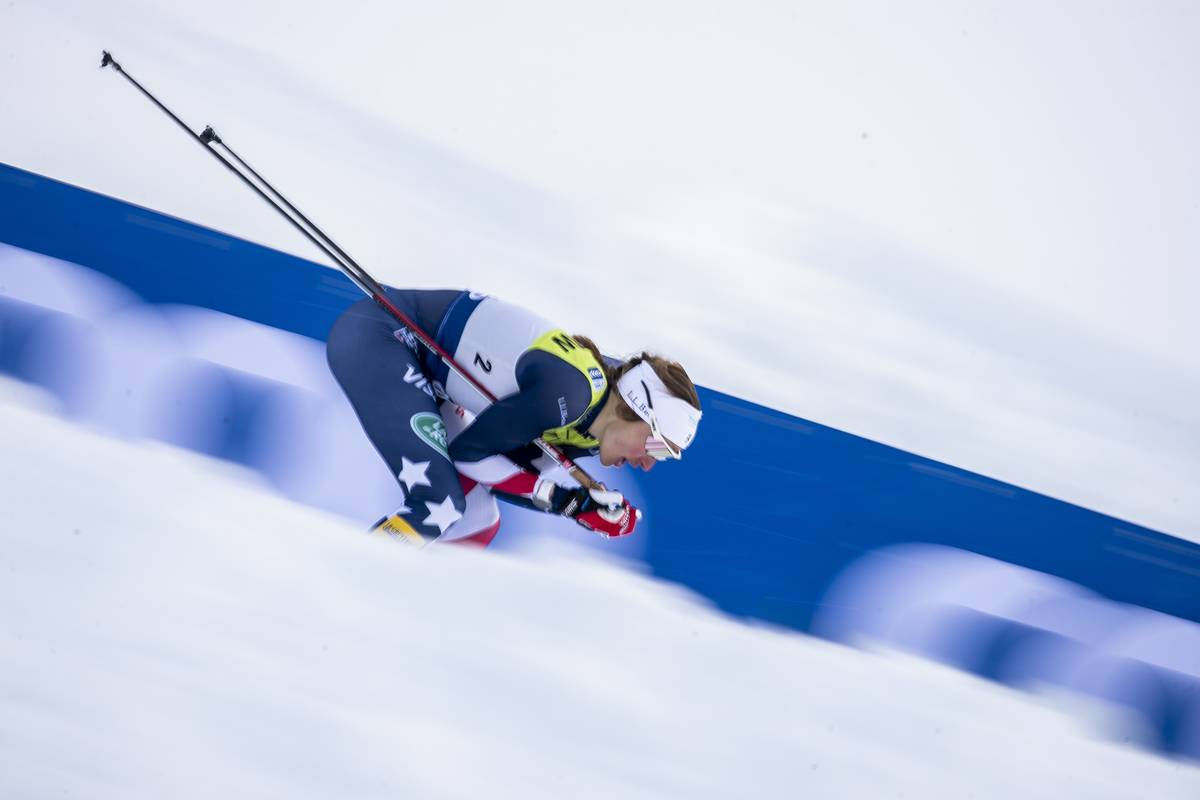
Jason Albert
Jason lives in Bend, Ore., and can often be seen chasing his two boys around town. He’s a self-proclaimed audio geek. That all started back in the early 1990s when he convinced a naive public radio editor he should report a story from Alaska’s, Ruth Gorge. Now, Jason’s common companion is his field-recording gear.

